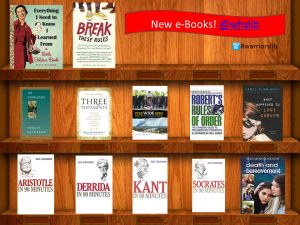 The Library has new e-books to download! E-books are available for viewing here. If you don’t already have an account to read e-books via the Library, students may ask a librarian for an account.
The Library has new e-books to download! E-books are available for viewing here. If you don’t already have an account to read e-books via the Library, students may ask a librarian for an account.
Everything I Need to Know I Learned From a Little Golden Book by Diane Muldrow
One day, Diane Muldrow, a longtime editor of the iconic Little Golden Books, realized that, despite their whimsical appearance, there was hardly a real-life situation that hadn’t been covered in the more than 70-year-old line of children’s books—from managing money, to the importance of exercise, to finding contentment in the simplest things. In this age of debt, depression, and diabetes, could we adults use a refresher course in the gentle lessons from these adorable books, she wondered—a “Little Golden guide to life”? Yes, we could!
Break These Rules: 35 YA Authors On Speaking Up, Standing Out, and Being Yourself by Luke Reynolds
If you’re a girl, you should strive to look like the model on the cover of a magazine. If you’re a boy, you should play sports and be good at them. If you’re smart, you should immediately go to college after high school, and get a job that makes you rich. Above all, be normal.
Right? Wrong, say 35 leading middle grade and young adult authors. Growing up is challenging enough; it doesn’t have to be complicated by convoluted, outdated, or even cruel rules, both spoken and unspoken. Parents, peers, teachers, the media, and the rest of society sometimes have impossible expectations of teenagers. These restrictions can limit creativity, break spirits, and demand that teens sacrifice personality for popularity.
The Upanishads by Eknath Easwaran
The Upanishads, the earliest of which were composed in Sanskrit between 800 and 400 bce by sages and poets, form part of the Vedas – the sacred and ancient scriptures that are the basis of the Hindu religion. Each Upanishad, or lesson, takes up a theme ranging from the attainment of spiritual bliss to karma and rebirth, and collectively they are meditations on life, death and immortality. The essence of their teachings is that truth can by reached by faith rather than by thought, and that the spirit of God is within each of us – we need not fear death as we carry within us the promise of eternal life.
Three Testaments: Torah, Gospel, and Quran by Brian Arthur Brown and Amir Hussain
From disagreement over an Islamic Center in New York to clashes between Christians and Muslims in Egypt, tension between the three Abrahamic faiths often runs high. Yet for all their differences, these three traditions Judaism, Islam, and Christianity share much in common. Three Testaments brings together for the first time the text of the Torah, the New Testament, and the Quran, so that readers can explore for themselves the connections, as well as the points of departure, between the three faiths. Notable religion scholars provide accessible introductions to each tradition, and commentary from editor Brian Arthur Brown explores how the three faiths may draw similarities from the ancient Zoroastrian tradition. This powerful book provides a much-needed interfaith perspective on key sacred texts.
Eyes Wide Openby Paul Fleischman
We’re living in an Ah-Ha moment. Take 250 years of human ingenuity. Add abundant fossil fuels. The result: a population and lifestyle never before seen. The downsides weren’t visible for centuries, but now they are. Suddenly everything needs rethinking – suburbs, cars, fast food, cheap prices. It’s a changed world. This book explains it. Not with isolated facts, but the principles driving attitudes and events, from vested interests to denial to big-country syndrome. Because money is as important as molecules in the environment, science is joined with politics, history, and psychology to provide the briefing needed to comprehend the 21st century. Extensive back matter, including a glossary, bibliography, and index, as well as numerous references to websites, provides further resources.
Robert’s Rules of Order: The Standard Guide to Parliamentary Procedure by Will Eisner
This definitive edition of the original “Robert’s” presents rules of order, motions, debate, conduct of business, and adjournment. All problems of conducting a successful meeting smoothly and fairly are resolved.
What Happened to Lani Garver by Carol Plum-Ucci
The close-knit residents of Hackett Island have never seen anyone quite like Lani Garver. Everything about this new kid is a mystery: Where does Lani come from? How old is Lani? And most disturbing of all, is Lani a boy or a girl? Claire McKenzie isn’t up to tormenting Lani with the rest of the high school elite. Instead, she befriends the intriguing outcast. But within days of Lani’s arrival, tragedy strikes and Claire must deal with shattered friendships and personal demons–and the possibility that angels may exist on earth.
Aristotle in 90 Minutes by Paul Strathern
Aristotle wrote on everything from the shape of seashells to sterility, from speculations on the nature of the soul to meteorology, poetry and art, and even the interpretation of dreams. Apart from mathematics, he transformed every field of knowledge that he touched. Above all, Aristotle is credited with the founding of logic. When he first divided human knowledge into separate categories, he enabled our understanding of the world to develop in a systematic fashion. In Aristotle in 90 Minutes, Paul Strathern offers a concise, expert account of Aristotle’s life and ideas, and explains their influence on man’s struggle to understand his existence in the world. The book also includes selections from Aristotle’s work; a brief list of suggested reading for those who wish to push further; and chronologies that place Aristotle within his own age and in the broader scheme of philosophy.
Derrida in 90 Minutes by Paul Strathern
In Derrida in 90 Minutes, Paul Strathern offers a concise, expert account of Derrida’s life and ideas, and explains their influence on man’s struggle to understand his existence in the world. The book also includes selections from Derrida’s writings; a brief list of suggested reading for those who wish to push further; and chronologies that place Derrida within his own age and in the broader scheme of philosophy.
Kant in 90 Minutes by Paul Strathern
Immanuel Kant taught and wrote prolifically about physical geography yet never traveled farther than forty miles from his home in Konigsberg. How appropriate that in his philosophy he should deny that all knowledge was derived from experience. Kant’s aim was to restore metaphysics. He insisted that all experience must conform to knowledge. According to Kant, space and time are subjective; along with various “categories,” they help us to see the phenomena of the world – though never its true reality. In Kant in 90 Minutes, Paul Strathern offers a concise, expert account of Kant’s life and ideas, and explains their influence on man’s struggle to understand his existence in the world. The book also includes selections from Kant’s work; a brief list of suggested reading for those who wish to push further; and chronologies that place Kant within his own age and in the broader scheme of philosophy.
Socrates in 90 Minutes by Paul Strathern
Just a century after it had begun, philosophy entered its greatest age with the appearance of Socrates, who spent so much of his time talking about philosophy on the streets of Athens that he never got around to writing anything down. His method of aggressive questioning, called dialectic, was the forerunner of logic; he used it to cut through the twaddle of his adversaries and arrive at the truth. Rather than questioning the world, he believed, we would be better off questioning ourselves. Socrates placed philosophy on the sound basis of reason. He saw the world as not accessible to our senses, only to thought. Finally charged with impiety and the corruption of youth, he was tried and sentenced to death – and ended his life by drinking the judicial hemlock. In Socrates in 90 Minutes, Paul Strathern offers a concise, expert account of Socrates’ life and ideas, and explains their influence on man’s struggle to understand his existence in the world. The book also includes selections from Socrates’ observations; a brief list of suggested reading for those who wish to push further; and chronologies that place Socrates within his own age and in the broader scheme of philosophy.
Death and Bereavement by Jody Kornfield and Sophie Waters
This book supports teens that are dealing with the death of a loved one, whether it is a family member or a close friend. The first chapter explains the general work of the grieving process, emphasizing that the particular way in which one grieves and the length of grieving are unique for each person. Other chapters present common reactions and advice for specific situations, such as the death of a parent or sibling or the suicide of a classmate. Coping strategies for the early aftermath of the death and for long-term adjustment are included. In addition to using self-help strategies, teens are encouraged to seek out professional help and/or support groups. Helpful resources are provided in the “For More Information” section.







